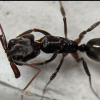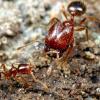- Formiculture.com
- Forums
- Gallery
- Members
- Member Map
- Chat

Laws regarding import into the U.K. and E.U.
Started By
SuperFrank
, Jun 27 2020 10:00 AM
11 replies to this topic
#1
 Offline
-
Posted June 27 2020 - 10:00 AM
Offline
-
Posted June 27 2020 - 10:00 AM
I am curious as to the laws regarding the import of live ant queens and colonies into the United Kingdom and continental Europe from abroad. We have secured permission from the relevant U.S. departments for export out of the country but are unfamiliar with European import laws.
- TennesseeAnts likes this
#2
 Offline
-
Posted June 27 2020 - 11:50 AM
Offline
-
Posted June 27 2020 - 11:50 AM
Europeans can import any ant species legally.
My journals:
Polyergus Mexicanus: https://www.formicul...gs/#entry175528
Lasius minutus: https://www.formicul...cs/#entry174811
Lasius latipes: https://www.formicul...gs/#entry206449
General acanthomyops journal: https://www.formicul...yops-with-eggs/
Polyergus Mexicanus: https://www.formicul...gs/#entry175528
Lasius minutus: https://www.formicul...cs/#entry174811
Lasius latipes: https://www.formicul...gs/#entry206449
General acanthomyops journal: https://www.formicul...yops-with-eggs/
#3
 Offline
-
Posted June 27 2020 - 2:54 PM
Offline
-
Posted June 27 2020 - 2:54 PM
For import into the EU, a health certificate is required with each specimen. Once in the EU, the package will go to a border station, where the paper work will be checked. You will need a pet transporter or other form of approved shipping process. In addition, a CVED is required (which will be attached at a border inspection in the EU should the paperwork be alright). Currently, shipping to the UK is very iffy but it does appear there is no regulation. However, I would wait until Brexit is cleared up, as they are in a transitional period. Specifics can be found on the EU website. Otherwise, all shipment to the EU is illegal
- 123LordOfAnts123 and TennesseeAnts like this
Visit us at www.canada-ant-colony.com !
#4
 Offline
-
Posted June 27 2020 - 4:05 PM
Offline
-
Posted June 27 2020 - 4:05 PM
For import into the EU, a health certificate is required with each specimen. Once in the EU, the package will go to a border station, where the paper work will be checked. You will need a pet transporter or other form of approved shipping process. In addition, a CVED is required (which will be attached at a border inspection in the EU should the paperwork be alright). Currently, shipping to the UK is very iffy but it does appear there is no regulation. However, I would wait until Brexit is cleared up, as they are in a transitional period. Specifics can be found on the EU website. Otherwise, all shipment to the EU is illegal
Can you link where you got this info? Securing permission to export specimens out of the U.S. was significantly easier than we would have thought and we hope import into Europe won't be terribly difficult either
- TennesseeAnts likes this
#5
 Offline
-
Posted June 27 2020 - 6:35 PM
Offline
-
Posted June 27 2020 - 6:35 PM
https://ec.europa.eu...th requirements.
A lot of the info I got was from speaking to someone in Europe who is an importer for some ant dealers. However, most of the info can be found above
A lot of the info I got was from speaking to someone in Europe who is an importer for some ant dealers. However, most of the info can be found above
Visit us at www.canada-ant-colony.com !
#6
 Offline
-
Posted June 28 2020 - 4:59 AM
Offline
-
Posted June 28 2020 - 4:59 AM
Every animal has to be inspected by a veterinary. And as importer you have to pay for this inspection: https://www.zoll.de/...eases_node.html
Additionally it will also be checked by customs if you try to import any species which are on cites list. But no ant species is on that list so this shouldn't be any problem
As with all goods you also have to pay 19% VAT.
But other than that it is quite easy to import animals and you also don't need any permission.
- TennesseeAnts and SuperFrank like this
#7
 Offline
-
Posted June 28 2020 - 6:28 AM
Offline
-
Posted June 28 2020 - 6:28 AM
Every animal has to be inspected by a veterinary. And as importer you have to pay for this inspection: https://www.zoll.de/...eases_node.html
Additionally it will also be checked by customs if you try to import any species which are on cites list. But no ant species is on that list so this shouldn't be any problem
As with all goods you also have to pay 19% VAT.
But other than that it is quite easy to import animals and you also don't need any permission.
Just out of curiosity, do you know if insects are included in the E.U's definition of animals? I know that may sound odd or ignorant but I was surprised to learn that, at least in the U.S., insects often aren't considered to be animals and have their own regulations.
- TennesseeAnts likes this
#8
 Offline
-
Posted June 28 2020 - 9:33 AM
Offline
-
Posted June 28 2020 - 9:33 AM
Of course they have their own regulations. Insects are some of the top destroyers of crops and the U.S. possesses a lot of crops that are highly valuable to it.Every animal has to be inspected by a veterinary. And as importer you have to pay for this inspection: https://www.zoll.de/...eases_node.html
Additionally it will also be checked by customs if you try to import any species which are on cites list. But no ant species is on that list so this shouldn't be any problem
As with all goods you also have to pay 19% VAT.
But other than that it is quite easy to import animals and you also don't need any permission.
Just out of curiosity, do you know if insects are included in the E.U's definition of animals? I know that may sound odd or ignorant but I was surprised to learn that, at least in the U.S., insects often aren't considered to be animals and have their own regulations.
My Ants:
(x1) Campontous semitstaceus ~20 workers, 1 Queen
(x1) Camponotus vicinus ~10 workers, 1 Queen (all black variety)
(x1) Tetramorium immigrans ~100 workers, 1 Queen
(x1) Myrmercocystus mexicanus -1 Queen
(x2) Mymercocystus mimcus -1 Queen
(x1) Mymercocystus testaceus ~45 workers, 1 Queen
(x1) Campontous semitstaceus ~20 workers, 1 Queen
(x1) Camponotus vicinus ~10 workers, 1 Queen (all black variety)
(x1) Tetramorium immigrans ~100 workers, 1 Queen
(x1) Myrmercocystus mexicanus -1 Queen
(x2) Mymercocystus mimcus -1 Queen
(x1) Mymercocystus testaceus ~45 workers, 1 Queen
#9
 Offline
-
Posted June 28 2020 - 9:56 AM
Offline
-
Posted June 28 2020 - 9:56 AM
Every animal has to be inspected by a veterinary. And as importer you have to pay for this inspection: https://www.zoll.de/...eases_node.html
Additionally it will also be checked by customs if you try to import any species which are on cites list. But no ant species is on that list so this shouldn't be any problem
As with all goods you also have to pay 19% VAT.
But other than that it is quite easy to import animals and you also don't need any permission.
Just out of curiosity, do you know if insects are included in the E.U's definition of animals? I know that may sound odd or ignorant but I was surprised to learn that, at least in the U.S., insects often aren't considered to be animals and have their own regulations.
There is no exception for insects or other invertebrates.
- TennesseeAnts and SuperFrank like this
#10
 Offline
-
Posted June 30 2020 - 4:21 AM
Offline
-
Posted June 30 2020 - 4:21 AM
Just out of curiosity, do you know if insects are included in the E.U's definition of animals? I know that may sound odd or ignorant but I was surprised to learn that, at least in the U.S., insects often aren't considered to be animals and have their own regulations.Every animal has to be inspected by a veterinary. And as importer you have to pay for this inspection: https://www.zoll.de/...eases_node.html
Additionally it will also be checked by customs if you try to import any species which are on cites list. But no ant species is on that list so this shouldn't be any problem
As with all goods you also have to pay 19% VAT.
But other than that it is quite easy to import animals and you also don't need any permission.
There is no exception for insects or other invertebrates.
Thanks for your help, a final question, do you know if is it the responsibility of the shipper or the recipient to obtain the permits?
#11
 Offline
-
Posted July 1 2020 - 12:06 AM
Offline
-
Posted July 1 2020 - 12:06 AM
The recipient is responsible for that.
In the past a lot of mostly private ant keepers tried to save the costs for importing ants, which led to ants intercepted and hold back by customs, that often lead to death of colonies...
#12
 Offline
-
Posted July 1 2020 - 2:46 AM
Offline
-
Posted July 1 2020 - 2:46 AM
I love insects and am currently an entomology student, I have no plans to ship specimens without proper paperwork, both for ethical and person reasons as it could have a huge negative impact on my career.The recipient is responsible for that.
In the past a lot of mostly private ant keepers tried to save the costs for importing ants, which led to ants intercepted and hold back by customs, that often lead to death of colonies...
Edited by SuperFrank, July 1 2020 - 5:42 AM.
1 user(s) are reading this topic
0 members, 1 guests, 0 anonymous users


















